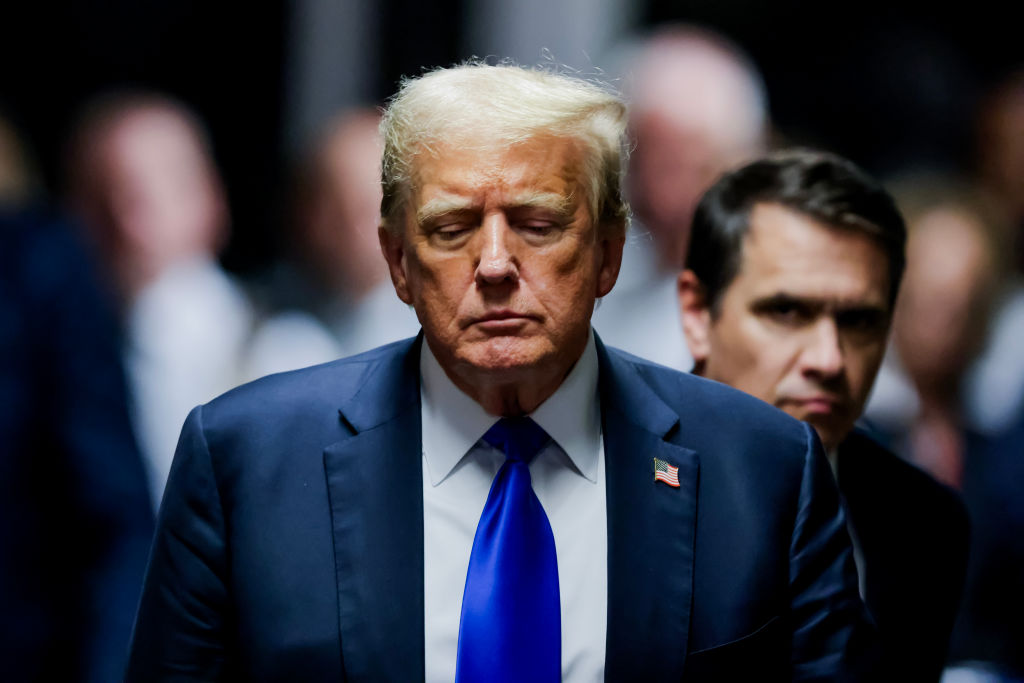The indictment and trial on a thin, jerry-built charge, the gagging of a presidential candidate in the midst of a campaign and the judge’s consistently biased rules amount to deliberate judicial interference in the 2024 election.
The process was led by a Manhattan district attorney, Alvin Bragg, who ran on the campaign platform of going after Donald Trump. Not going after a crime. Going after a person. That fundamentally contradicts the basic principles of Anglo-American law and justice. It is an outrage.
No one else in New York City would have been indicted, as Donald Trump was, on two expired misdemeanors, which the Manhattan DA magically turned into a felony. Then, he took the one alleged felonious act and magically turned it into thirty-four counts.
What, you may ask, was this felony? Who the hell knows? It’s still not clear. Think about that for a moment. The former president was tried and convicted for a felony that dare not speak its name.
The prosecution never named this crucial felony during the testimony. We only learned what it might be during the prosecution’s summation. Since the prosecution spoke last, the defense had no chance to respond to. In fact, the jury was allowed to choose from three underlying crimes and didn’t need to agree on what they were. When the judge came up with that gem, he was inviting the jury to convict. It wasn’t his first time. It was his standard operating procedure.
What did the prosecution stress in the summation? It was mainly election interference. The idea was that the catch-and-kill payments about the Stormy Daniels story, made to the National Enquirer and handled by Michael Cohen, changed the outcome of the 2016 election.
There are some glaring problems with that approach. The first is that campaign election violations are the responsibility of the federal government and normally handled exclusively by them for federal election. Yet the federal government, the real experts in this process, chose not to prosecute. Alvin Bragg knew better. At least he knew what was better politically in New York.
He knew he would draw a jury pool that, if it was like the rest of Manhattan, loathed Donald Trump and overwhelmingly rejected his candidacy. The judge was cut from the same cloth and effectively served as a member of the prosecution team. He let prosecution witnesses to offer their (uninformed) opinions about these campaign-finance issues, but slammed the door shut on the defense effort to rebut them. Trump’s team wanted to call one of the country’s leading experts on campaign finance to refute those claims. Judge Merchan flatly refused.
His instructions to the jury was just as fair-minded. To take just one example, he omitted a crucial point for Trump’s side: a “missing witness” instruction. The prosecution had complete control of one potential witness, Allen Weisselberg, the chief financial officer for the Trump Organization. Weisselberg, who is now in jail for lying under oath, worked with Michael Cohen to arrange the bookkeeping entry that is the heart of the prosecution case. The prosecution refused to call Weisselberg, presumably because they figured his testimony would hurt their case. The judge should have told the jury that they can reasonably make that assumption.
That’s not a trivial point. For the jury to make anything out of the bookkeeping entry, they had to believe Trump willingly created the false entry and did it to conceal a crime. The only person who actually said that was Michael Cohen. And we all know Michael Cohen is an honorable man.
We don’t know how voters will respond to the verdict. The last elections have been decided by razor-thin margins so even small changes could make a difference.
The public respects the courts, though its deference has dwindled considerably over the years. The Democrats have made undermining trust in the courts a major theme once they lost control of the Supreme Court. Even so, the public retains some residual respect for the judicial system, and that may affect independent voters in key swing states like Pennsylvania, Michigan, and Wisconsin. That will depend on how much they weight the outcome of the New York trial versus how much they weight the process (and whether they see that process as unfair).
During the trial itself, Trump’s support actually grew among independent, swing state voters. They thought, correctly, that the trial was part of an unfair “lawfare” campaign, aimed at keeping Trump off the campaign trail, soaking up his campaign chest, and smearing him with criminal charges.
But a conviction is different from an indictment and trial. We don’t know what the effect will be. We do know that it will be the second arrow in Biden’s quiver, and he and his surrogates will use it. (The other arrow is abortion.) We know the mainstream media will gloat. They will be led by the New York Times and Washington Post. We know, too, that Trump and his allies will cry foul. Repeatedly and with increasing ferocity.
What we don’t know is what a middle-class, independent voter in the suburbs of Philadelphia, Detroit or Milwaukee will think? The election may very well turn on that judgment.


























Leave a Reply